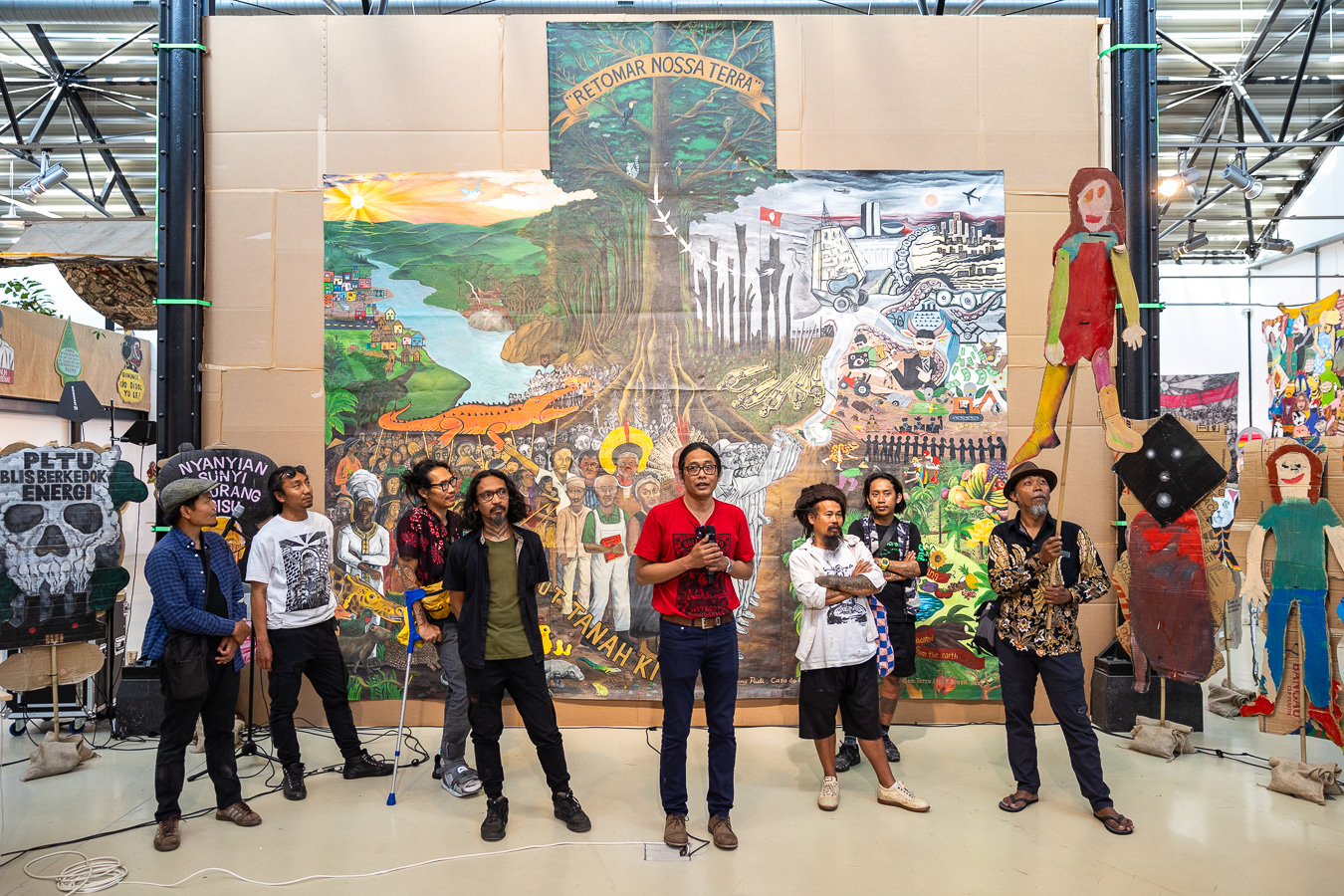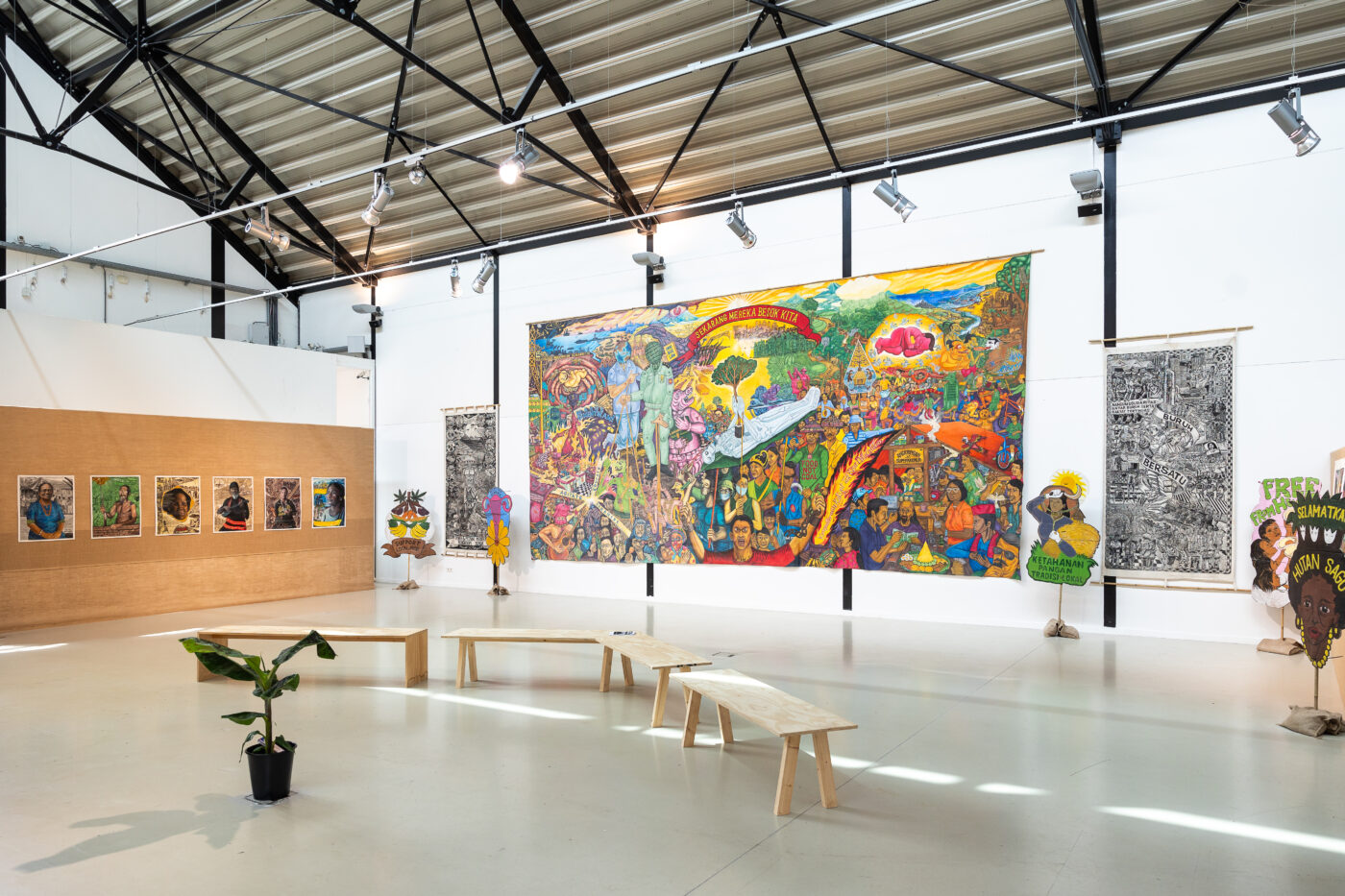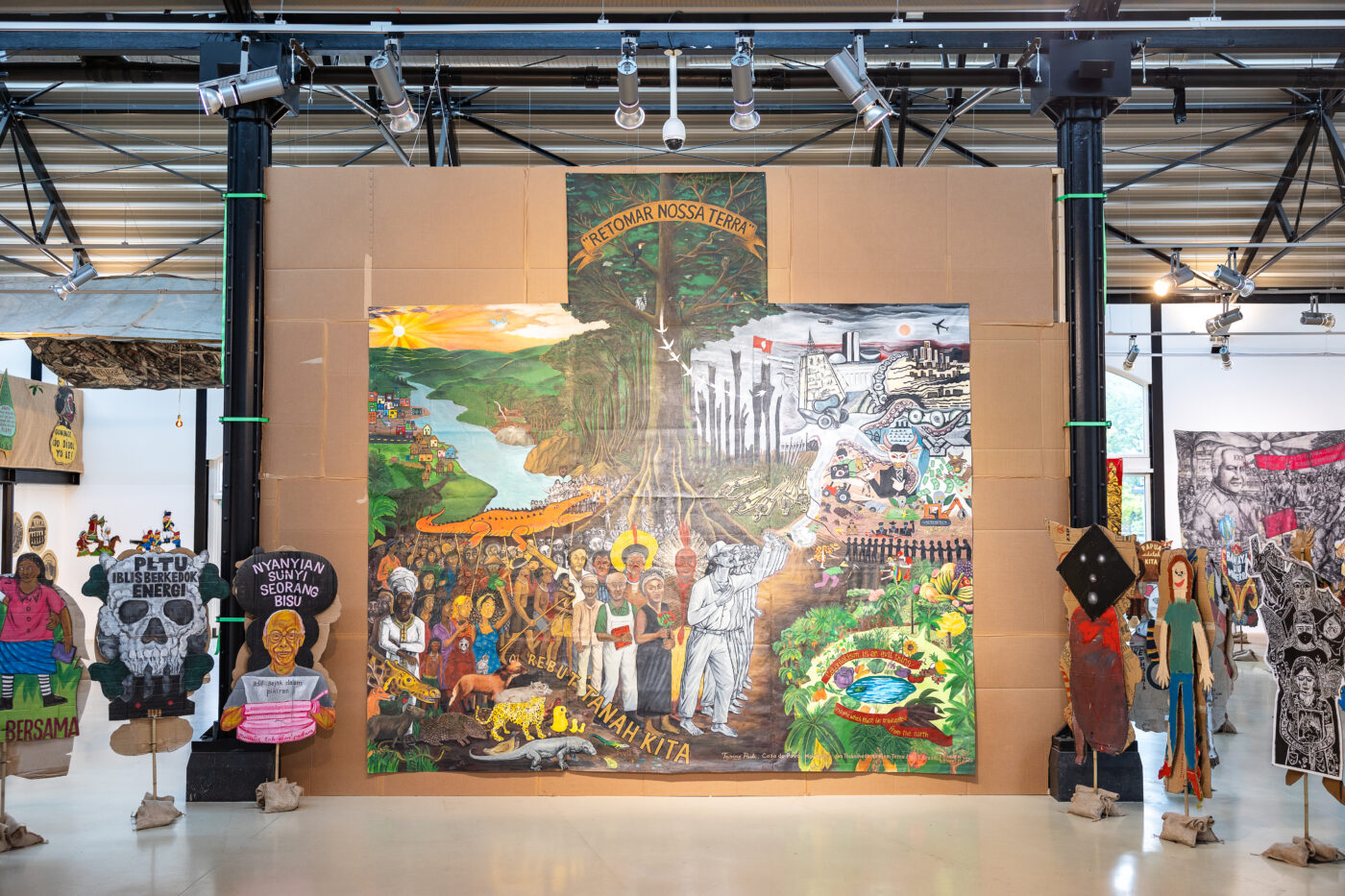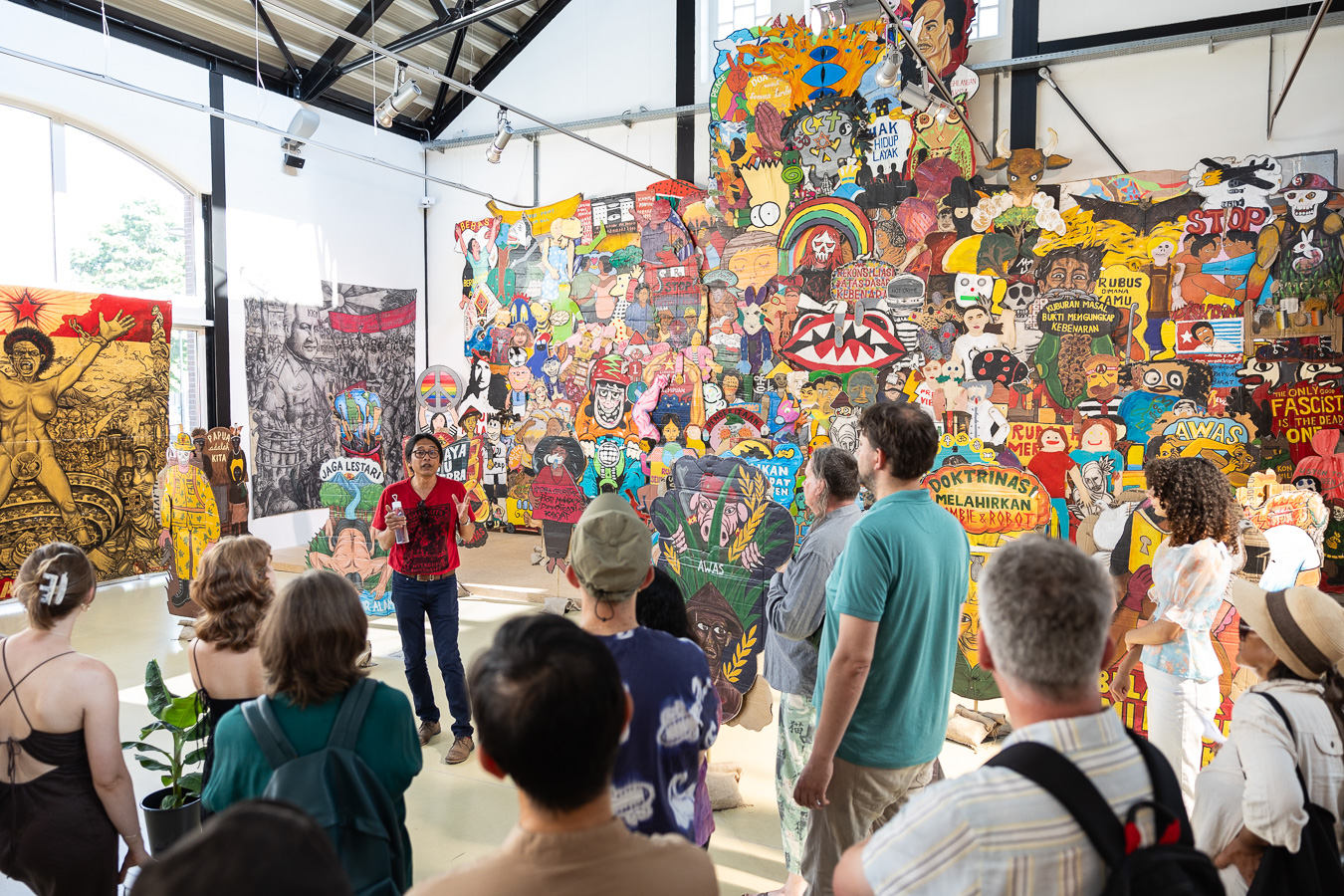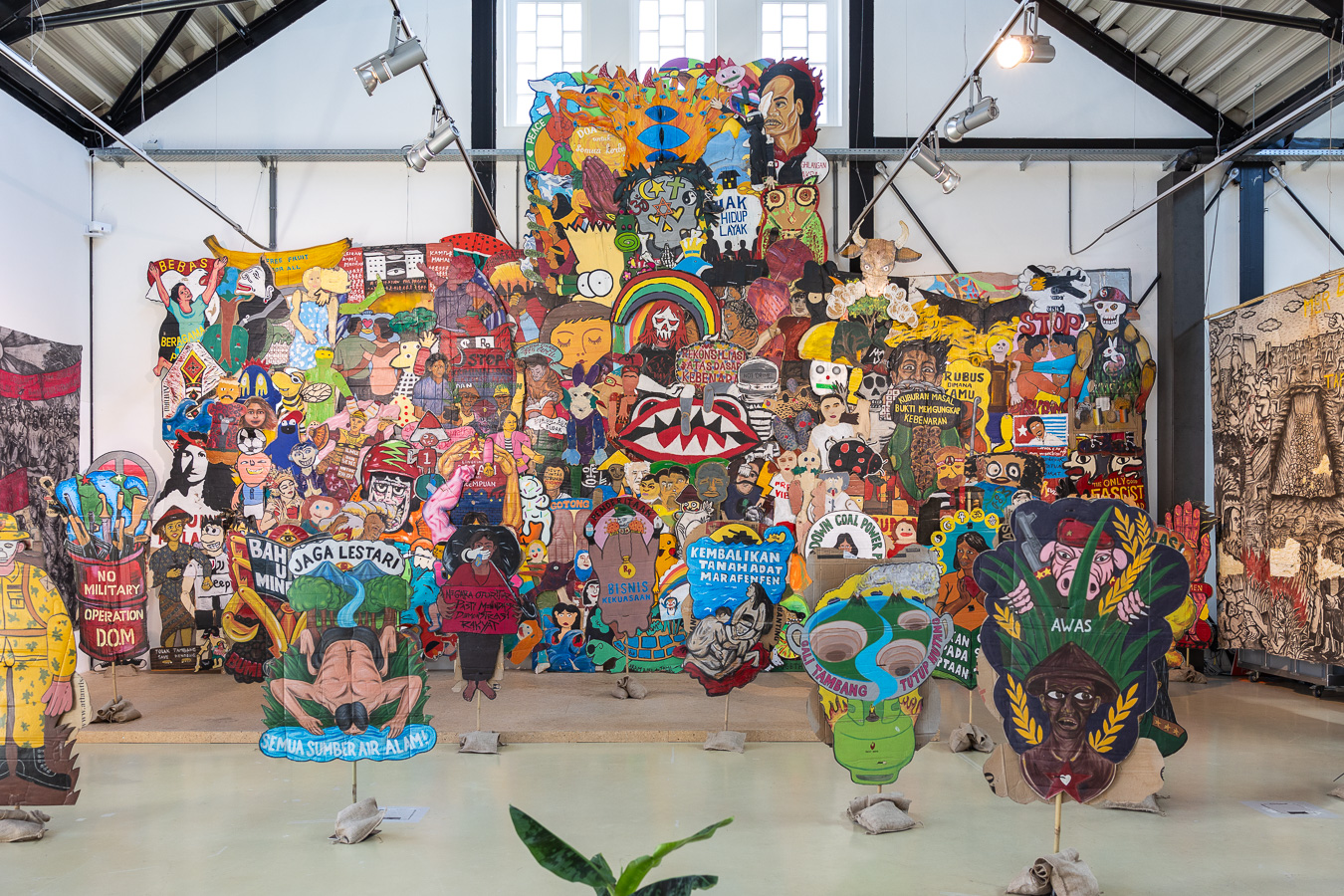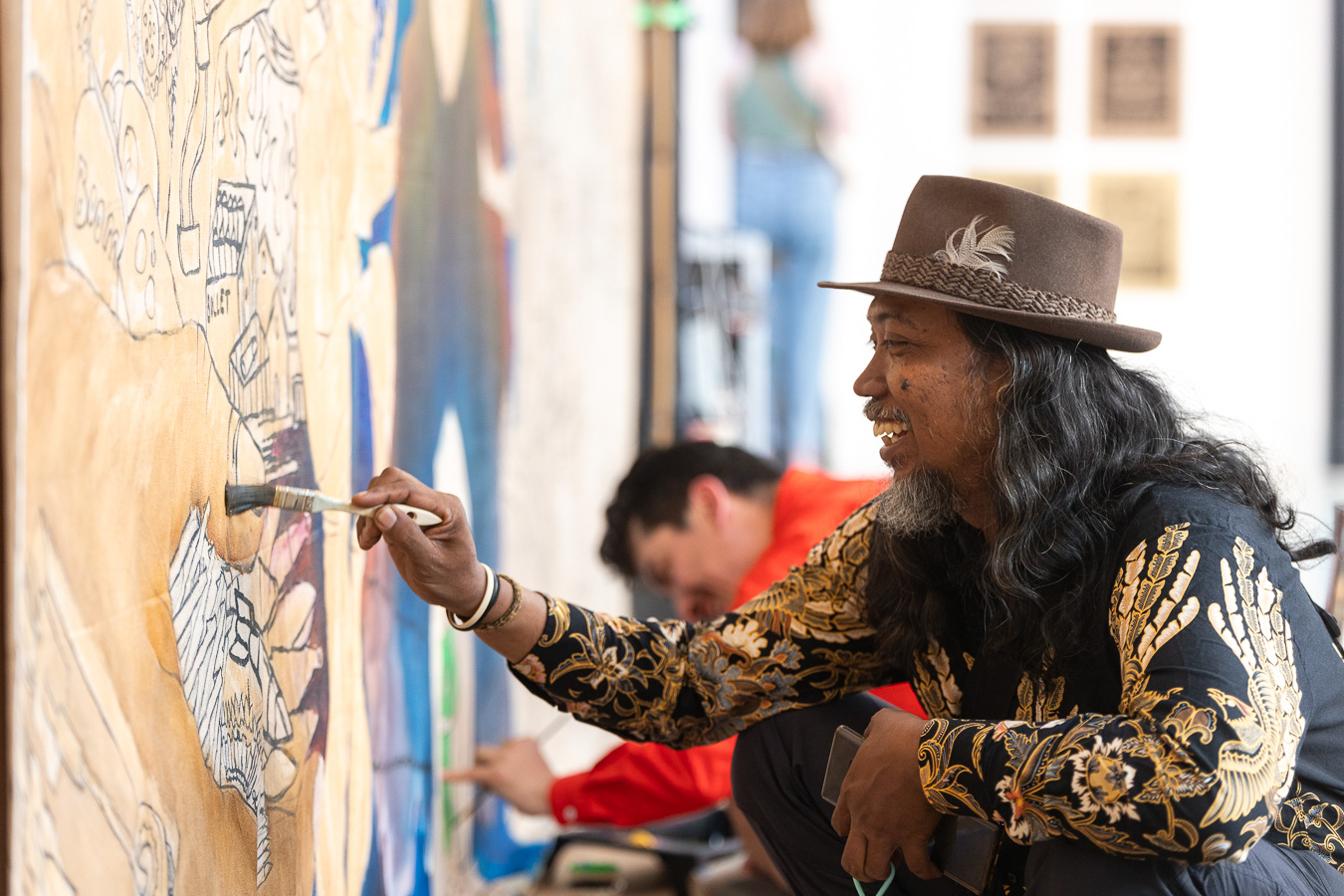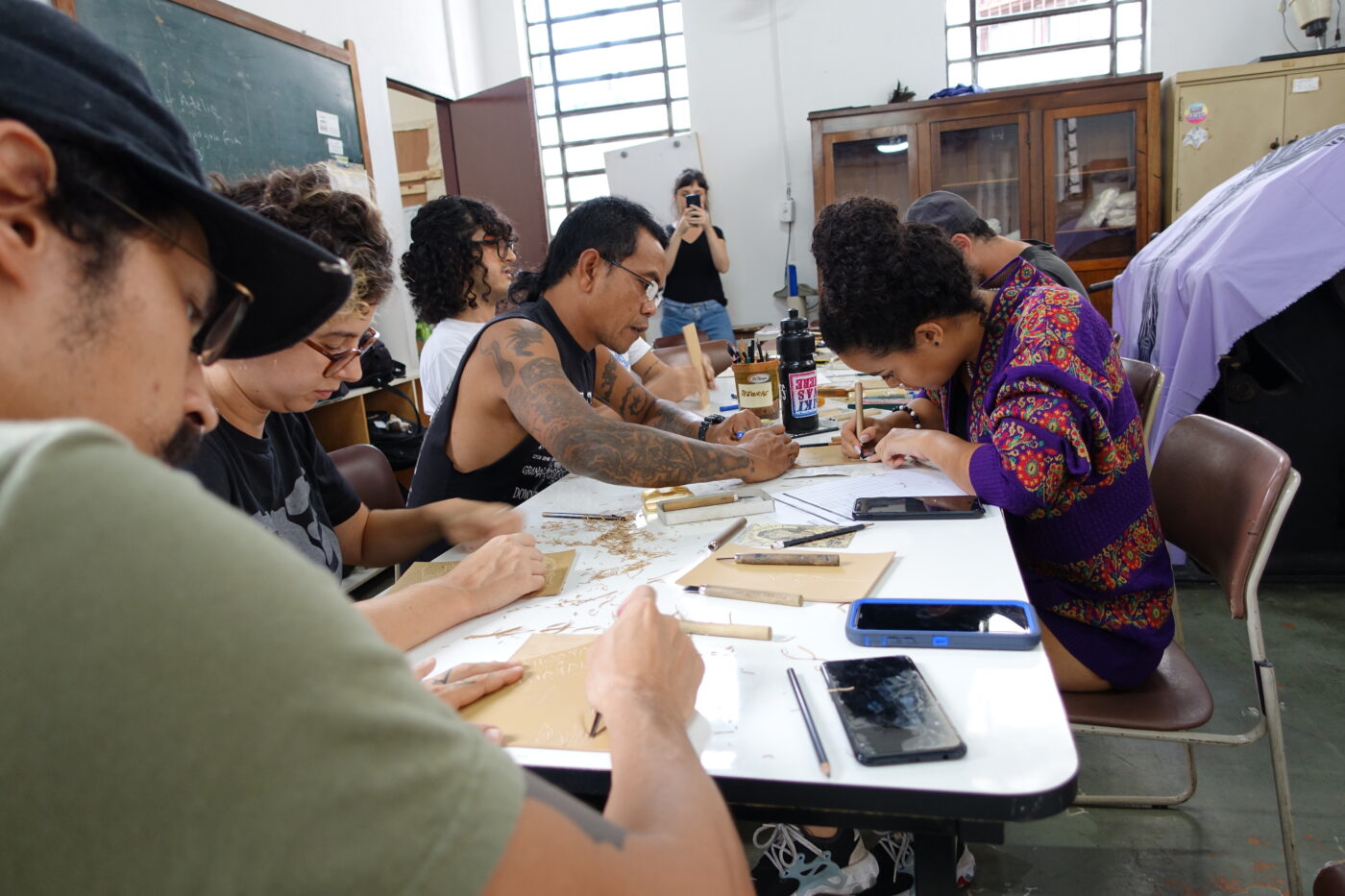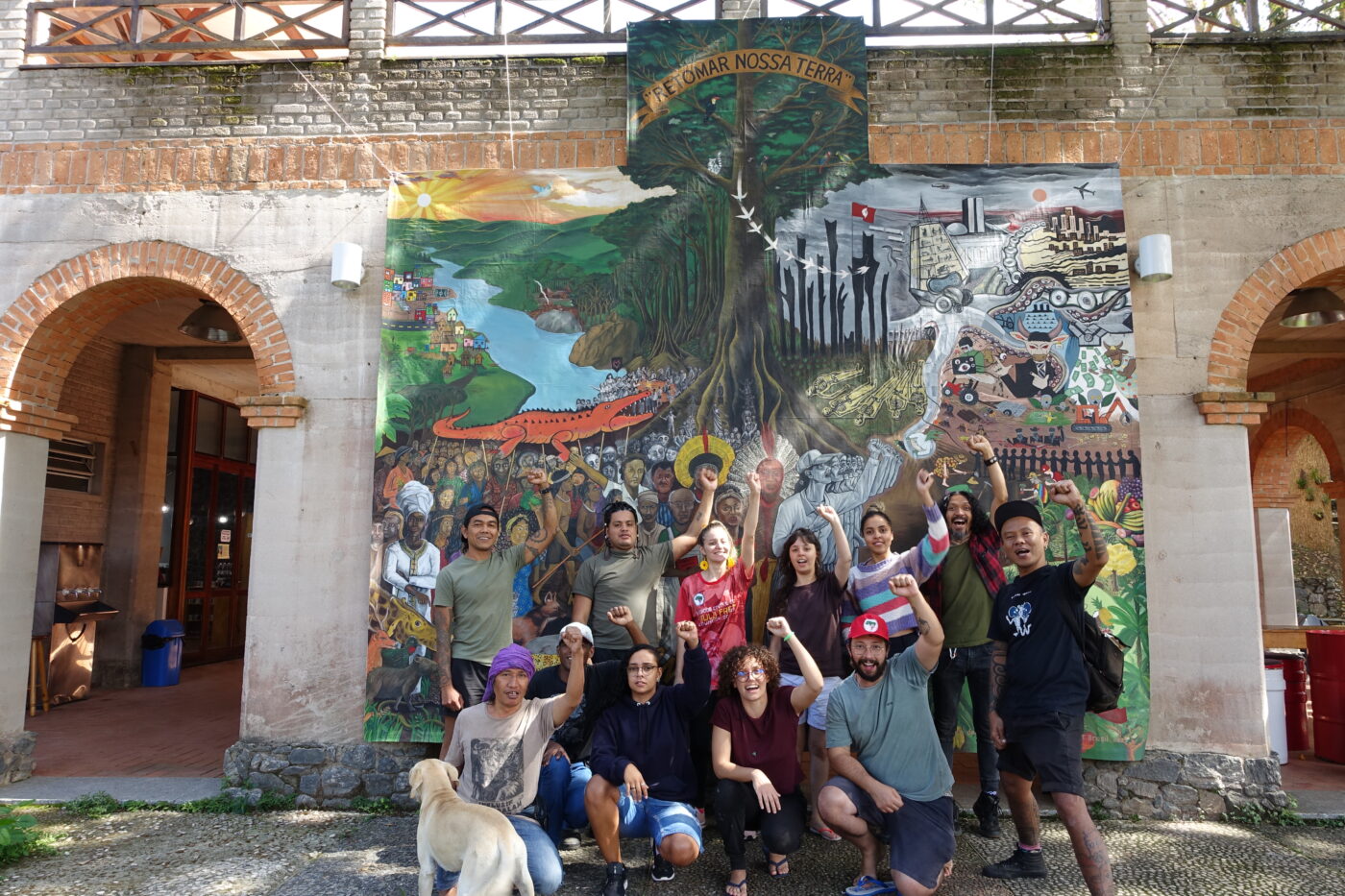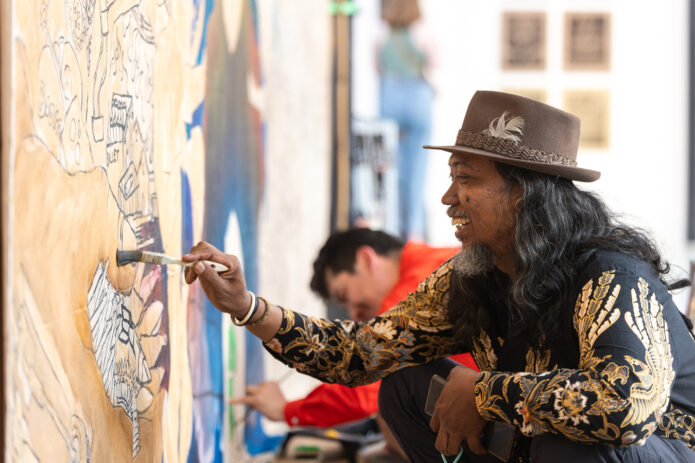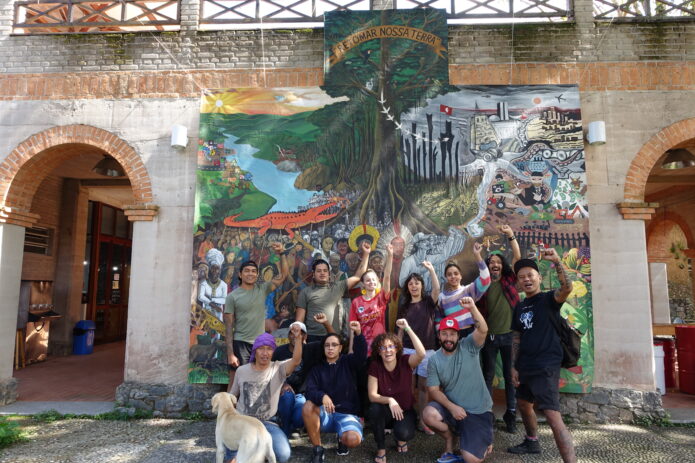The making of Tanah Merdeka - Dialogue through collaborative practices
Framer Framed is honoured to present Tanah Merdeka, an exhibition by the Indonesian collective Taring Padi in partnership with the Jewish organization Casa do Povo and Movimento dos Trabalhadores Rurais Sem Terra (MST), the Brazilian landless workers’ movement.
Drawing from the Indonesian expression ‘tanah merdeka’ (liberated land), the exhibition features large-scale banners, woodcut prints and cardboard puppets with a focus on land as the primary object of decolonial struggles. These works, stretched over more than two decades of the collective’s practice since their foundation in 1998, are realised through methods of storytelling and co-creation with communities and activist groups around the world. From resource extraction, state violence, to corporate exploitation towards the environment, Taring Padi’s work manifests their vision of art as a political tool for social action. Their commitment and consistency in being part of ongoing struggles and changing relations through artistic work inspire us to embark on this journey to share and learn from their anti-colonial, collective practice.
Taring Padi emerged within a context of oppression and resistance, marking their collective work for a span of 25 years. The group has remained fluid in nature, with members joining and departing throughout the years. They have engaged directly with individuals and communities all around the world and employed a democratic methodology rather than demanding centralised control over their work. The collective consistently advocates for freedom and democracy while opposing the forces that impede them. Their vision embraces the aspiration for liberated land, the concept of Tanah Merdeka. Through this exhibition, Framer Framed endeavors to spark a dialogue about Taring Padi’s practice and perseverance over the past decades, accomplished in collaboration with numerous local communities and marginalised groups.
Over the past years, Framer Framed has been invested in creating discursive events and exhibitions addressing Dutch colonialism and its legacy, and how systems of oppression continue to affect living conditions of communities today. Framer Framed wants to create avenues where marginalised histories can be told and seen from other perspectives. For example, with artist Kevin van Braak, we organised the exhibition Pressing Matters (2018), in which 24 artists from Indonesia – amongst them several Taring Padi members – were invited to address pressing socio-political issues in Indonesia. Curated by Sadiah Boonstra, On the Nature of Botanical Gardens (2020) examined the colonial operating structures in the classification of nature and its representations of botanical gardens through the works of nine contemporary Indonesian artists. In spring 2022, Framer Framed facilitated Taring Padi’s Wayang Kardus Workshop with local artists and participants and co-produced cardboard puppets that were later presented at documenta fifteen in Kassel, Germany. These efforts originated from a similar desire to not only represent, but make liveable – through artistic practice and collective work – a plurality of voices in a globalised society.

Installatiefoto Pressing Matters (2018) bij Framer Framed, Amsterdam. Foto: Maarten van Haaff / Framer Framed
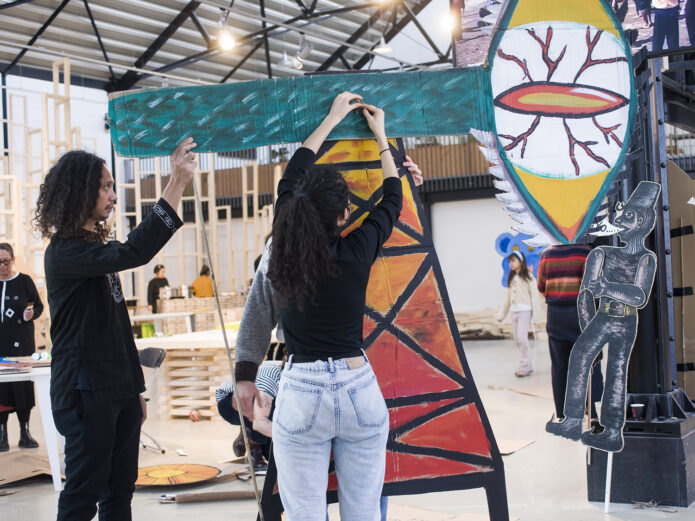
DIT – Wayang Kardus Workshop at Framer Framed. Photo: Ju-An Hsieh
In response to the discussions that unfolded surrounding the depiction of antisemitic figures in one of Taring Padi’s early works People’s Justice (2002) during documenta fifteen in Kassel, Germany, the artwork was removed from the public space. Taring Padi openly apologised for the figures that had sparked the controversy, stating:
“We deeply regret the extent to which the imagery of our work People’s Justice has offended so many people.” ¹
The experience was particularly disconcerting for the collective, given their history and practice against forms of dictatorship, racism, and fascism. The complexity of the situation motivated us to continue the dialogue regarding how this incident occurred and the genuine intention behind the artwork. If the members of the collective express an intention contrary to what was perceived, it is essential to allow for a space of discussion. Such conversations have already taken place in numerous forms over the past year, both in person and online.
Amongst the many meaningful things that developed from these conversations was a collaborative project by Taring Padi, Casa de Povo, Landless Workers’ Movement of Brazil (MST) and Framer Framed. This joint allyship started from collective learning sessions, site visits, and resulted in the creation of a new banner. The work titled Retomar Nossa Terra / Rebut Tanah Kita (2023) – translated as ‘Reclaiming the Land’ – is an expression commonly used in both Brazil and Indonesia by many social movements. The creative process involved over ten individuals, including members from Taring Padi, MST, and their comrades. Through its rich imagery, the banner conveys the notion that land serves as a shared foundation for comprehending the causes and effects of colonialism and capitalist exploitation. Furthermore, it serves as a platform for resistance against various forms of injustice.
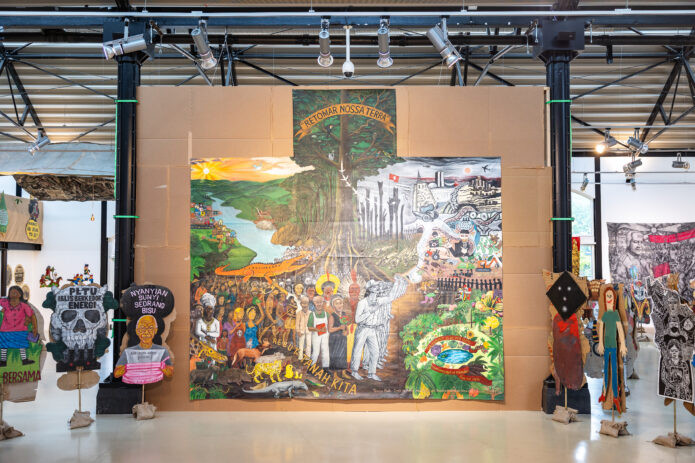
Retomar Nossa Terra / Rebut Tanah Kita (2023) by Taring Padi, Casa do Povo, MST and Framer Framed. Photo: Maarten Nauw / Framer Framed
Our initial conversation with Casa do Povo and Taring Padi took place towards the end of documenta fifteen. During that time, Framer Framed organised the symposium (un)Common Grounds: Reflecting on documenta fifteen (2022), where participating artists, collectives, and individuals from diverse political backgrounds and disciplinary fields gathered to provide contextual understanding of the 100 days in Kassel, Germany. This symposium emphasised the importance of enabling open, equitable, and respectful conversations, as well as the significance of initiating a healing process through co-creation and collaboration. It taught us invaluable lessons on the power of open dialogue and collective healing, and the significance of maintaining a free space for encounter, experimentation and exchange.

Image Courtesy: Casa do Povo, Brazil
Collaborating with Taring Padi, MST, and Casa do Povo has been a humble learning experience. In our preparations for this exhibition, we also reached out to friends both within and outside the Netherlands. These individuals generously shared their knowledge about various historical events and contexts, including the Second World War, the Shoah, the decolonisation process, Dutch aggression, the atrocities committed by the Suharto regime in Indonesia in 1965, as well as the ongoing situation in Papua New Guinea and the Moluccas.
Considering what happened at documenta fifteen, we believe it is crucial to engage in conversations with individuals, particularly from the Jewish community, who have been affected by the banner People’s Justice shown in Kassel in 2022. We are therefore particularly grateful for the courageous and generous gestures of our colleagues at Casa do Povo, with whom we have been collaborating intensively for the past year. We extend our gratitude and appreciation to all those who were willing to join us in this ongoing journey and look forward to creating new relations and bonds with you, through Tanah Merdeka.
Framer Framed
¹ Taring Padi, Statement by Taring Padi on dismantling People’s Justice, 2022.
- Casa do Povo - São Paulo
- Metropolis M - Reflecting on documenta fifteen, by Jack Segbars
- documenta 15
- Taring Padi
Links
Collectives / Indonesia / Colonial history / Art and Activism /
Exhibitions
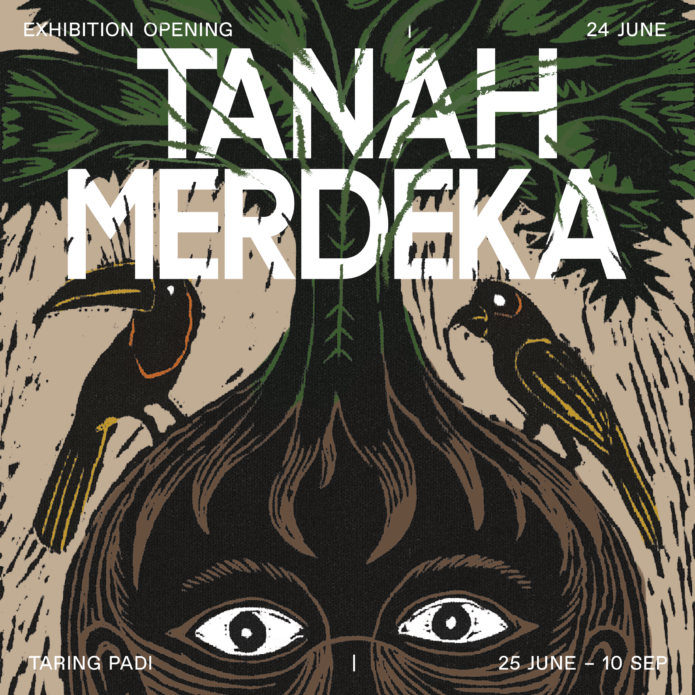
Exhibition: Tanah Merdeka
An exhibition with the Indonesian art & activist collective, Taring Padi, reflecting on the concept of land as the object and site of decolonial struggles.
Agenda
Finissage: Tanah Merdeka
The last day of the exhibition, with a guided tour in Bahasa Indonesia, a performance by Samboleap Tol, and a painting & woodcut printmaking workshop with Taring Padi members
Workshop: Linocut Printmaking – Tanah Merdeka
Co-creating a lino print poster with Sophia Pekowsky & Ilya Genov to reflect on transnational solidarity and land struggles
Roundtable Conversation: Tanah Merdeka
Roundtable conversation with researchers and curators from different art museums and institutions within the context of Taring Padi's exhibition, Tanah Merdeka.
Symposium: (un)Common Grounds - Reflecting on documenta fifteen
A two-day hybrid symposium co-organised by Framer Framed, Akademie van Kunsten & Van Abbemuseum
Workshop: Wayang Kardus - Struggle and Solidarity with Taring Padi
A two-day workshop by Taring Padi with food, conversations, jamming sessions and the production of cardboard puppets
Network

